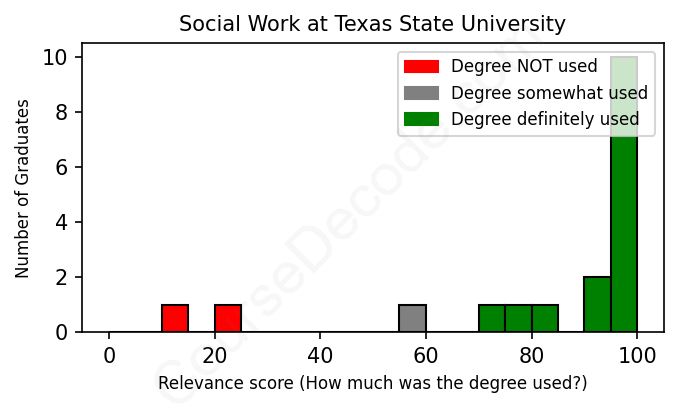
First, some facts. Of the Social Work graduates from Texas State University we've analyzed , here's how many have used (or NOT used) their degree in their career:

These are estimates based on AI analysis of 18 LinkedIn profiles (see below).
The verdict? Significantly above average. Overall, with an average relevance score of 83%, Social Work graduates from Texas State University have a much higher likelihood (+16%) of finding work in this field compared to the average graduate across all fields:
And for comparison, here's the chart for all profiles we've looked at across all degrees.
Also, after graduating, 44% of these graduates have pursued further education other than another Bachelor's degree (such as a Masters degree or other), compared to the average across all profiles of 35%. This suggests you may need more than just a Bachelors degree to be competitive as a Social Work graduate.
See the details:
|
Relevance score: 100% We think this person has gone into a career highly relevant to their degree. We think this person has gone into a career highly relevant to their degree.
DEGREE INFOGraduated in 2016 from Texas State University with a Bachelors Degree in Social Work. Also pursued further education since (see below). JOB HISTORY SINCE GRADUATIONIntern Communities In Schools of South Central Texas Jan 2016 - May 2016 Outreach Counseling Intern  Lehman High School Aug 2018 - Dec 2018 Houseparent  The Settlement Home for Children Nov 2016 - Aug 2017 Youth Care Counselor  The Settlement Home for Children Aug 2017 - Nov 2018 Part Time Awake Night Youth Care Counselor  The Settlement Home for Children Nov 2018 - Mar 2019 Site Coordinator  Communities In Schools of South Central Texas Feb 2019 - Present FURTHER DEGREES DONE SINCE GRADUATINGMaster of Social Work - MSWTexas State University 2017 - 2018 ABOUTNo information provided. |
The top 10 most common jobs done by the graduates we've analyzed (ranked most common to least) are:
When looking at the job titles of graduates from Texas State University's Social Work program, it's clear that many of them have pursued careers that are directly related to social work. Common roles like Social Worker, Child Protective Services Specialist, and eligibility/intake specialist positions stand out as they align closely with the foundations laid during their studies. These roles often require the application of essential social work skills such as assessment, intervention, and advocacy, demonstrating a strong connection between their academic training and the work they do in the field.
However, not all job placements are relevant to social work. Some graduates ventured into positions like sales, marketing, or administrative roles that may only minimally engage with social work concepts. For example, roles such as a recruiter or a production associate can benefit from interpersonal skills developed during their degree but do not fundamentally rely on the core social work knowledge. Overall, the majority of job placements are quite relevant to social work, with many graduates successfully translating their education into impactful careers within the field, while a smaller portion has found themselves in unrelated fields where their social work skills may or may not be fully utilized.
Here is a visual representation of the most common words in job titles for Social Work graduates (this is across all Social Work graduates we've analyzed, not just those who went to Texas State University):

Graduates with a degree in Social Work from Texas State University generally seem to follow a clear and meaningful path toward building careers in the social sector. Many of them start off in roles closely aligned with social work immediately after graduation, like eligibility specialists or social workers in local health systems and community service organizations. After about five years, we see a lot of them moving up in their careers, taking on more specialized roles such as case managers or working in state departments like the Texas Department of Family and Protective Services. For those who have been out in the field for ten years or more, many continue to hold significant positions in social work, often with leadership responsibilities or on initiatives that focus on vulnerable populations. It's great to see that the majority of these professionals are thriving in positions that relate directly to their degree.
However, there are also some individuals who took a different route, moving into roles that are less related to social work, like corporate recruiting or even part-time jobs in retail and optical services. While it's not uncommon to see graduates explore various opportunities post-college, those who divert significantly from social work may end up in careers that don’t fully utilize the skills and knowledge they gained during their studies. Overall, it looks like most Texas State University alumni stick with their mission-driven careers, which is encouraging for anyone considering this path. It shows that a Social Work degree can open a lot of doors to a fulfilling career helping others, even if some graduates end up exploring other fields along the way.
Alright, so when it comes to a Bachelor’s degree in Social Work at Texas State University—or really any place—it’s not exactly a walk in the park, but it’s not the hardest thing you could tackle either. Generally, you’ll dive into subjects like human behavior, social justice, and community engagement, which can be pretty thought-provoking and sometimes emotionally challenging. You’ll have to do a good amount of reading, writing, and maybe some group projects that require you to work well with others. Plus, there’s usually a practicum or internship component where you’ll get hands-on experience, and that can be both exciting and a bit demanding. So, while it has its tough spots, if you’re passionate about the subject, you might find it rewarding more than difficult. Just be ready to stay organized and committed!
Most commonly, in the LinkedIn profiles we've looked at, it takes people 4 years to finish a Bachelor degree in Social Work.
Based on the job history of these Texas State University social work graduates, it seems like some of them have been able to make decent money, while others are probably earning a bit less. For example, the ones who have been with the Texas Department of Family and Protective Services or have held positions in hospitals likely have a more stable income, which is cool since those roles often pay better than the other social work gigs. On the flip side, there are graduates who have bounced around various internships and part-time positions, and that could mean they’re not raking in the big bucks just yet. Overall, it looks like there's a mix: some are on solid paths in well-paying roles, while others are still climbing the ladder in a field known for lower salaries. So, they might be making a decent living, but there's definitely a lot of variability!
Here is a visual representation of the most common words seen in the "about" section of LinkedIn profiles who have a Bachelor degree in Social Work (this is across all Social Work graduates we've analyzed, not just those who went to Texas State University). This may or may not be useful:

Here are all colleges offering a Bachelor degree in Social Work (ordered by the average relevance score of their Social Work graduates, best to worst) where we have analyzed at least 10 of their graduates: